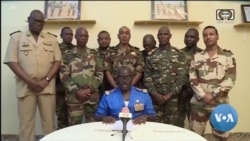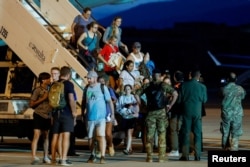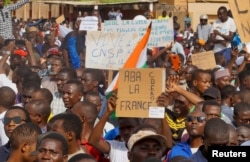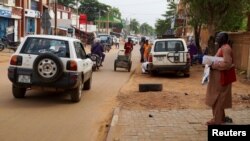The White House says it's closely watching a coup in Niger, as the U.S. Embassy prepares to evacuate some staff from the West African nation. With the coup plotters staring down a Sunday deadline to reinstate the deposed democratically elected president, analysts say Moscow and Beijing are also monitoring Niamey, and looking for opportunities to widen their influence.
"We're watching this very, very closely," John Kirby, director of strategic communications for the National Security Council, told reporters this week. "And we haven't made any decision but we'll certainly engage in a rigorous process to evaluate our assistance going forward."
Coup mirrored other takeovers
Last week's coup in Niger followed the model set by recent coups in Mali, Guinea and Burkina Faso: A group of military officers, unhappy over poor security and bad governance, captured the country's leader, took over the airwaves and declared themselves in charge.
But strikingly similar optics aside, this West African coup is different, and has Washington watching "hour by hour" to see if frantic diplomacy will bring the deposed president — for whom the State Department has expressed "unwavering support" — back to power.
That's because Niger is a key U.S. partner in fighting Islamic extremism in the Sahel, with a critical U.S. drone base and hundreds of U.S. troops in the country.
"Two weeks ago, less than two weeks ago, we had here a team of our militaries for a meeting with the United States authorities," Niger's ambassador to the U.S., Mamadou Kiari Liman-Tinguiri, told VOA this week, speaking in French. "We went together to the Pentagon. We went together to the State Department. ... They pride themselves for doing better than all our neighbors, they pride themselves for that so. ... And a week later we're doing bad. What does this mean? It doesn't make any sense at all."
'This is a proxy war'
Analysts note that this fragile, resource-rich region is also in the crosshairs of other major powers, with Russian mercenary group Wagner increasing its foothold in neighboring countries.
"This is a proxy war," Sean McFate, a professor at Syracuse University and at the National Defense University, told VOA. "And there has been an ongoing proxy war in Africa for the last three to four to five years at least."
"But here the external forces are the United States, Russia and China," he said. "Russia likes to conquer, if you will, through the Wagner group. China likes to use economic warfare, called the Belt and Road initiative. It's sort of debt trap diplomacy, think of Tony Soprano, ripping you off, giving you a loan, you can't repay it and suddenly you owe favors to Beijing."
The State Department said it hasn't seen proof that Russian mercenaries were involved, but it said they will likely try to capitalize on the instability.
"I would not be surprised to see Wagner attempt to exploit this situation to their own advantage, as they've attempted to exploit other situations in Africa to their own advantage," spokesman Matthew Miller said on Wednesday. "And when I say to their own advantage, I mean to their own personal financial advantage, as well as their attempt to expand their influence on the continent."
"But I would add that any attempt by the military leaders in Niger to bring the Wagner forces into Niger, would be a sign, yet another sign, that they do not have the best interests of the Nigerien people at heart," Miller said.
McFate said he doubts the putschists in Niamey will bend to pressure from Washington or the West. Earlier this week, protesters gathered in the capital to blame former colonial power France for the coup.
"The U.S. has sort of ignored Africa since the Black Hawk Down incident 30 years ago, and there's only a sort of starting to show interest again, with some minor counterterrorism bases in the Horn of Africa, the Sahel," he said. "But a lot of Africans don't see the United States as a committed partner. So I think that the opportunities for carrots and sticks from Washington are limited and they're frankly being challenged by Russia and China."
The EU and Britain immediately stopped aid, and some U.S. programs were halted to the landlocked country. On Wednesday, the State Department issued a "do not travel" advisory to Niger.
The ECOWAS regional body gave the coup leaders a Sunday deadline to reinstate the president and have threatened force if they don't comply.
VOA's Abdourahmane Dia contributed to this report from Washington.








